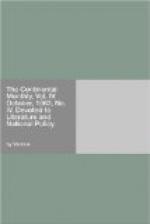CHAPTER VI.—TRUTH AND LOVE.
The Divine Attributes, the base of all true Art.
Art must be based upon a study of Nature, upon a clear and comprehensive knowledge of natural laws. No man was ever yet a great poet without being at the same time a profound philosopher, for Poetry is the blossom and fragrance of all human knowledge, human thoughts, human passions, and human emotions. The poet must have the ability to observe things as they really are, in order to depict them with accuracy, unchanged by any passion in the mind of the describer, whether the things to be depicted are actually present to the senses, or have a place only in the memory.
Nature may be regarded either as the home of man, and consequently associated with all the phases of his existence; or as an assemblage of symbols, manifesting the thoughts of the Creator. In accordance with the first view, the poet may give it its place in the different scenes of human life, animated with our passions, sympathizing with us, and expressing our feelings; in the second, he must try to interpret this divine language, to seize the idea gleaming through the veil of the material envelope, for there is an established harmony between material nature and intellectual. Every thought has its reflection in a visible object which repeats it like an echo, reflects it like a mirror, rendering it sensible first to the senses by the visible image, then to the thought by the thought.
Genius is the instinct of discovering some more of the words in this divine language of universal analogies, the key of which God alone possesses, but some portions of whose stores he sometimes deigns to unclose for man. Therefore in earlier times the Prophet, an inspired poet; and the poet, an uninspired prophet—were both considered holy. They are now looked upon as insane or useless; and indeed, this is but a logical consequence of the so-called utilitarian views. If only the material and palpable part of nature which may be calculated, percented, turned into gold, or made to minister to sensual pleasures, is to be regarded with interest; if the lessons of the harvest, with its ’good seed and tares,’ and the angels, its reapers; the teachings of the sparrow and the Divine Love which watched over them; the grass and the lilies of the field clothed in splendor by their Creator, are to awaken neither hope nor fear—then men are right in despising those who preserve a deep reverence for moral beauty; the idea of God in his creation; and respect the language of images, the mysterious relations between the visible and invisible worlds. Is it asked what does this language prove? The answer is, God and Immortality! Alas! they are worth nothing on ’Change!
Yet let him who would study his own happiness and well-being, follow the advice given in the Good Book:
’Look upon the
rainbow, and bless Him that made it, for it is very
beautiful.




